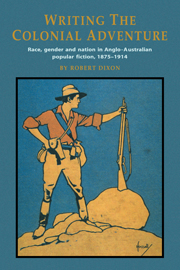 Writing the Colonial Adventure
Writing the Colonial Adventure Book contents
- Frontmatter
- Contents
- List of Illustrations
- Acknowledgements
- Introduction
- 1 The Romance of Property: Rolf Boldrewood and Walter Scott
- 2 Outlaws and Lawmakers: Boldrewood, Praed and the ethics of adventure
- 3 Israel in Egypt: The significance of Australian captivity narratives
- 4 Imperial Romance: King Solomon's Mines and Australian romance
- 5 The New Woman and the Coming Man: Gender and genre in the ‘lost-race’ romance
- 6 The Other World: Rosa Praed's occult fiction
- 7 The Boundaries of Civility: Australia, Asia and the Pacific
- 8 Imagined Invasions: The Lone Hand and narratives of Asiatic invasion
- 9 The Colonial City: Crime fiction and empire
- 10 Beyond Adventure: Louis Becke
- Conclusion
- Notes
- Select Bibliography
- Index
2 - Outlaws and Lawmakers: Boldrewood, Praed and the ethics of adventure
Published online by Cambridge University Press: 05 November 2011
- Frontmatter
- Contents
- List of Illustrations
- Acknowledgements
- Introduction
- 1 The Romance of Property: Rolf Boldrewood and Walter Scott
- 2 Outlaws and Lawmakers: Boldrewood, Praed and the ethics of adventure
- 3 Israel in Egypt: The significance of Australian captivity narratives
- 4 Imperial Romance: King Solomon's Mines and Australian romance
- 5 The New Woman and the Coming Man: Gender and genre in the ‘lost-race’ romance
- 6 The Other World: Rosa Praed's occult fiction
- 7 The Boundaries of Civility: Australia, Asia and the Pacific
- 8 Imagined Invasions: The Lone Hand and narratives of Asiatic invasion
- 9 The Colonial City: Crime fiction and empire
- 10 Beyond Adventure: Louis Becke
- Conclusion
- Notes
- Select Bibliography
- Index
Summary
How often … in the reckless daring of boyhood is the fatal line crossed which severs imprudence from crime!
Rolf Boldrewood, A Modern BuccaneerIn seeing Rolf Boldrewood as an ‘Australian’ writer we lose sight of the fact that Australian writing in the second half of the nineteenth century was locked into the broader arrangements of publishing throughout the British Empire. The text of Robbery Under Arms – first as a serial in Australia, then as a three-decker novel published in London, and later as a one-volume novel in Macmillan's Colonial Library – evolved over a number of years at a crucial period in the writing of imperial adventure/romance. Robert Louis Stevenson's landmark adventure novel Treasure Island was serialised in Young Folks in 1881–2 and published as a one volume novel by Cassell in 1883, the same year that Robbery Under Arms was serialised in the Sydney Mail. Stimulated by the success of Treasure Island, H. Rider Haggard published King Solomon's Mines in 1885, then She and Allan Quatermain, both in 1887. The publication of these novels sparked an intense debate in the late 1880s over the ethics of adventure which had an important bearing on writing in and about Australia.
The ethical dilemmas posed by adventure tales arose from the requirement that they suture together conflicting models of masculinity. On the one hand, pluckiness of spirit, physical prowess and military derring-do were admired as the traits of imperial boyhood.
- Type
- Chapter
- Information
- Writing the Colonial AdventureRace, Gender and Nation in Anglo-Australian Popular Fiction, 1875–1914, pp. 30 - 44Publisher: Cambridge University PressPrint publication year: 1995


